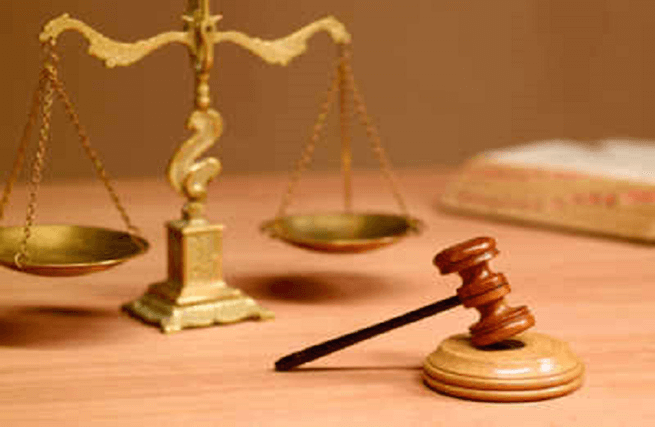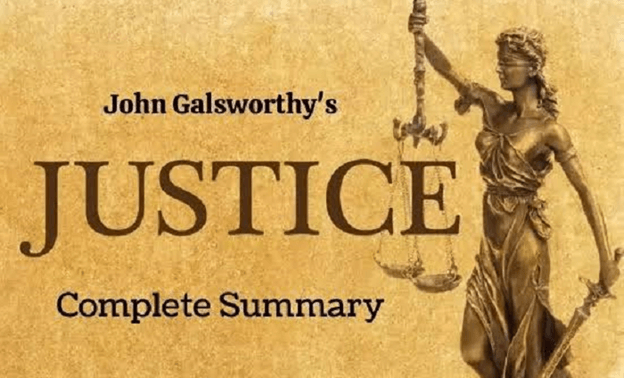Summary of JusticeIntroductionThe drama Justice was written by John Galsworthy, a well-known English playwright and writer. The play addresses a variety of issues about justice, law, and morality. Justice is a drama about crime and punishment that criticizes the legal system across the world, as the affluent always leave the poor to languish in jail. Galsworthy wants his readers to understand the circumstances that lead the poor man in his story to decide to commit this illegal act, highlighting the phenomenon of forgery where the criminal is apprehended and justice triumphs. As a result, Galsworthy wants the audience to read and view the play through human eyes rather than through the eyes of earthly law and order. PlotThe drama opens at the office of solicitors, James How & Sons. A young woman arrives at the door, followed by children, and requests a special meeting with the junior clerk, William Falder. The woman, Ruth Honeyville turns out to be Falder's married girlfriend, with whom he intends to elope to spare her from the brutal behavior and maybe death by her drunken husband. When the senior employee at the office, Robert Coxon learns that a cheque that he has issued for nine pounds has been changed to read ninety, Falder admits to forging and claims that he did it out of madness. Recognizing that he will be in a difficult situation with the young woman, Coxon expresses a considerable level of compassion towards Falder, and so does Walter How, the junior partner of the firm. However, senior partner James How does not agree and turns Falder over to the authorities. The second act begins in a courtroom during Falder's trial. He is represented by a young lawyer, Hector Frome, who, while not denying that his client had changed the cheque, wants a temporary delay of the trial and claims that Falder is unable to cope with such a difficult situation with the woman he loved and was searching for something that the lady he loved couldn't have i.e. legal protection. Either she had to live in terror of her husband, or she could seek a separation (brutal behavior on the husband's part alone is not a reason enough for divorce), in which case she would be unable to work or spend time with her children. She might have to sell her body in order to support herself. He begs the jurors not to ruin the young man's life by imprisoning him. Falder is found guilty and sentenced to three years in prison. Coxon goes to Falder's jail and asks if Ruth may meet the prisoner, but finds little sympathy. Ruth informs Coxon that she has divorced her spouse and is in a very miserable state as well as unable to support herself or her children. Falder accepts his jail reluctantly, and after his term, he leaves the prison completely shattered and broken. Ruth and Falder meet at the solicitor's offices, where Ruth begs the partners of the firm to give Falder a second opportunity and accept him back. The companions grudgingly agree to their requests but only on the condition that he entirely abandons Ruth. Falder is shocked to find that she has only managed to exist in his absence by selling herself. 
Not long after, Falder is arrested by a police officer for failing to report to authorities as a person on leave. Falder, who is fed up with his fate, jumps from an upper window and falls to his death. The drama concludes with the words of the senior clerk who has worked tirelessly to help him, "No one will harm him now! Never, ever again! He is safe with gentle Jesus!" Analysis of the PlayThe drama Justice sheds light on the sorrow and predicament of the poorest strata of society, who find themselves standing at the periphery their whole life, and centers on the narrative of the impoverished clerk Falder and a miserable married lover Ruth, who is subjected to social and sexual oppression by her husband. Falder decides to put Ruth out of her pain after realizing how helpless she is and forging checks to aid his distressed lover. He assures Ruth that she will live a joyful and fulfilled life free from these difficulties. 
Falder is apprehended by his superiors, taken to court, and found guilty of forgery and having an illegal connection with a married lady. As a result, the jury chose to condemn Falder to solitary prison, where he will spend the remainder of his days. Falder welcomes death to escape his problems and anxieties since he never experiences freedom in life, not even after being released from prison. Galsworthy intends for his readers to ponder upon how miserable the lives of Falder and Ruth had been that led them to commit such unlawful deeds while demonstrating the play's evident triumph of justice and the legal system. The writer has exposed the flaws in the justice system, which punishes the poor harshly without considering the circumstances behind their crimes. Ruth's wealthy husband never receives punishment for bothering his wife, while poor Falder is swiftly punished when he forges a cheque out of desperation. The author expresses his feelings by harshly criticizing the legal system's bias in favor of the wealthy while punishing the poor and oppressed. ThemesSeveral important themes are at work in the drama. The writer draws light on many important rules and regulations that are hypocritical and are only made to punish the poor while favoring the rich. Some of them include the impact of social class on a man's life, the flaws in judiciary systems nowadays, the rise of corruption and hypocrisy in modern society, and so on. Some Important Terminologies1. Social classThe drama Justice addresses how the social class of people affects the legal system, how people are different from each other by their social class, what is the limitation of social division, and how having a high class is a pass to commit whatever crimes you want. Political theory and social science conceptions of social stratification that place people into hierarchical social categories, such as the upper class, middle class, and lower class, are collectively referred to as social classes. There is no consensus on what the word "class" signifies since it has a wide variety of sometimes conflicting implications. A group of people who are in the same socio-economic class are referred to as belonging to the same social, economic, cultural, political, or educational status. Examples include "the working class" and "an emerging professional class." Social class and socioeconomic position are separate concepts in academia, with the former referring to a usually stable sociopolitical background and the latter to a person's current social and economic status, which tends to fluctuate more over time. The precise criteria used to identify social class have changed over time. According to Karl Marx, a person's "class" is based on how closely they are connected to the means of production. His roughly defined classes in contemporary capitalist society as the proletariat or those who work but do not own the means of production, and the capitalists, who invest in and live off the surplus created by the proletariat's operation of the means of production. The sociologist Max Weber had a different perspective, arguing that although "social position" or "standing" is defined by social standing rather than just a person's relationship to production, "class" is established by economic status. The word "CLASS" is etymologically related to the Latin word classis, which census officials used to categorize people according to their income to determine whether they had to do military duty. As the main method of dividing society into hierarchical divisions in the late 18th century, the term "class" evolved to apply to categories like estates, ranks, and orders. This is in line with a general decline in the significance of inherited traits and a rise in the significance of money and income as markers of rank in the social order. 2. Social JusticeThe phrase "social justice" refers to a very broad idea that includes everything connected to the notion of the "common good," which ranges from safeguarding the rights of minorities to eradicating poverty and illiteracy. It has to do with eliminating those revolting social ills like poverty, sickness, unemployment, malnutrition, etc., as well as upholding the idea of equality before the law and the independence of the judiciary, as we see in Western nations. Many emerging nations in the third world have suffered greatly because of the lack of social justice. The elimination of entrenched interests that stand in the way of accomplishing the public interest and are in favor of maintaining the status quo is also a problem. From this vantage point, the need for the state to make earnest efforts to better the status of the underprivileged and backward segments of society arises from the concept of social justice in the world's developing and underdeveloped nations. 
Social justice demands that the disadvantaged sections of the society be enabled to overcome their socioeconomic disabilities and improve their standard of living, the most disadvantaged sections of society below the poverty line, especially the children, women, and children of the poor. Empowered people should be helped and thus an exploitation-free society should be established. Social justice means that there should not be any kind of discrimination between human beings based on social status, every person should have equal opportunities for proper development of their powers, no person should be exploited in any form, every person's minimum needs should be fulfilled, economic power should not be concentrated in a few hands, and the weaker sections of the society should not feel helpless. In the modern period, the idea of social justice has been quite successful in raising awareness. Mahatma Gandhi and Bhimrao Ambedkar both emphasized the need for social justice in their writings and speeches in India. Throughout his life, Mahatma Gandhi campaigned for the development of social justice. His efforts at social change and his patronage theory show a deep sense of social fairness. Jawaharlal Nehru's humanism was deeply rooted in the concept of social justice. Socioeconomic fairness was reflected in his socialist thought. He consistently emphasized the need for the establishment of social justice without any concentration of economic power and the need for all societal segments to benefit from development efforts. 4. MoralityMorality is a principle that always, at every moment, at every turn, and in every circumstance informs us of what is good and wrong for us. There are times in life when we only have to pick one choice, yet there are many viable ones. However, even if we don't want to, we can only pick one. We frequently express ourselves in ways that contradict what our hearts and minds are trying to convey. They are both right. Then what should we do? If we think of it this way, then every time we make a choice when there is a mental conflict or a duality, we always give up one thing or the other since there is only one decision we need to make and one way to go from it, yet we are not mistaken until unless we make our decisions morally. 4. EthicsEthics are an important part of a person's life. Personal ethics refers to the ethics with which a person identifies concerning individuals and events encountered in daily life. Professional ethics refers to the ethics that a person must follow in their professional relationships and commercial operations. Personal and professional ethics may collide in some instances, resulting in a moral dilemma. As an example: A police officer may personally think that a law he is obligated to enforce is incorrect. However, according to the New Zealand Police Code of Conduct, he is expected to execute all legitimate and reasonable commands to enforce the law unless there are good and sufficient grounds to do differently. ConclusionIn his play Justice, John Galsworthy uses a satirical tone to criticize the unjust practices of the court system, which permits upper-class individuals to get away with their crimes while locking up poor people for minor crimes that mostly happen because of their terrible circumstances. The playwright highlights a thought-provoking social issue of injustice to his audience and readers in the play's ironic title to persuade them to read and view his play through a human lens so that the audience can decide whether the judiciary declares justice and equality for all, or the poor people living a miserable life are to blame for the crimes committed in the world.
Next TopicHoregallu Lesson Summary
|
 For Videos Join Our Youtube Channel: Join Now
For Videos Join Our Youtube Channel: Join Now
Feedback
- Send your Feedback to [email protected]
Help Others, Please Share









